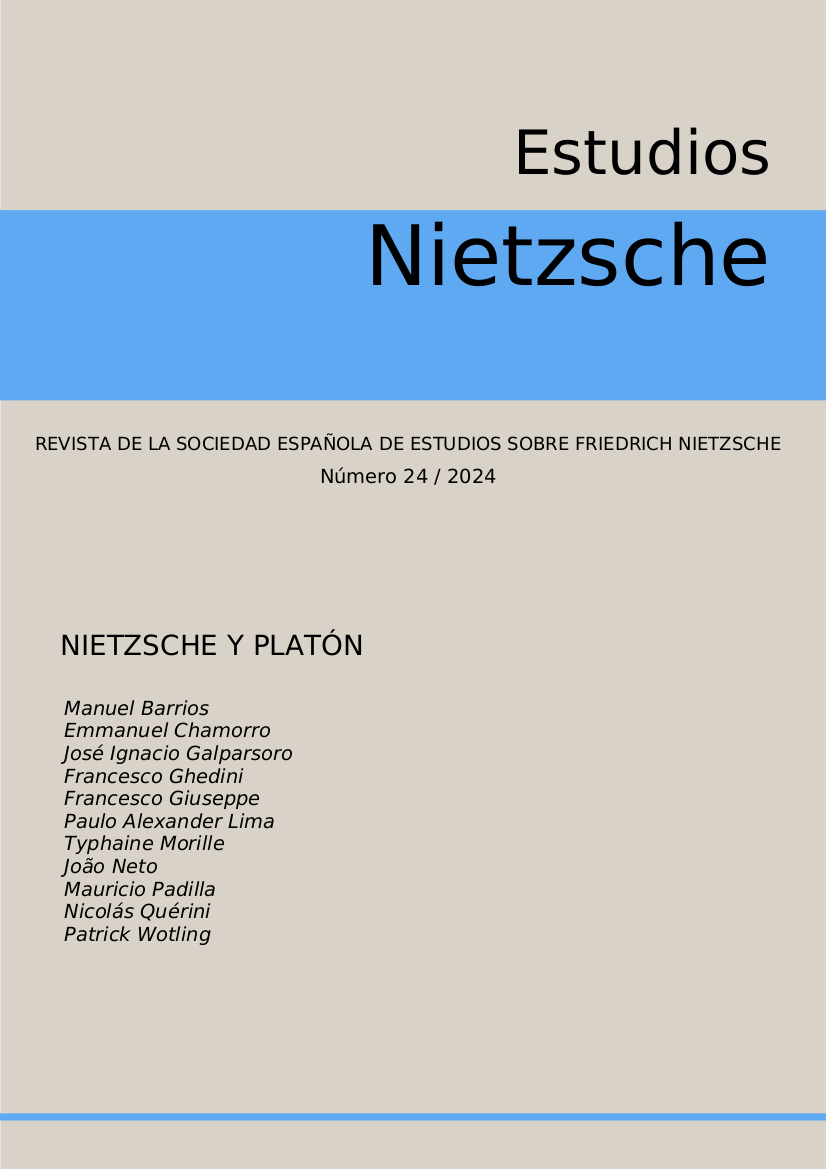The presence of Plato and the spectrum of Schopenhauer in Nietzsche’s lectures, On the Future of Our Educational Institutions
DOI:
https://doi.org/10.24310/en.24.2024.18078Keywords:
Educational Institutions, Bildung, Schopenhauer, cultureAbstract
We have set out here to highlight two references that underlie Nietzsche’s argument in his lecture On the Future of Our Educational Institutions. The philosopher shares with Plato and Schopenhauer a natural aristocracy of the mind, i.e. the idea that nature is stingy in its production of geniuses. In these conditions, it’s understandable that he should feel «frightened» by the «democratization» of the university he is witnessing. We show, however, that he plays Plato off against Schopenhauer, but does not follow the Greek philosopher all the way. First, Nietzsche stresses that far from believing that the university and culture should be at the service of the State, it is the State that should be at the service of Bildung, and it is what would emerge from the Platonic model. We claim that there is a kind of hesitation on Nietzsche’s part, who wonders whether the institution can still create Bildung or whether it is not outside that it should be sought and built, in which case we are closer to Schopenhauer.
Downloads
Metrics
References
Astor, Dorian (ed.), Dictionnaire Nietzsche, Paris : Robert Laffont, 2017.
Chrétien, Jean-Louis, L’effroi du beau, Paris, Les éditions du cerf, 2011.
Dixsaut, Monique, Platon-Nietzsche, L’autre manière de philosopher, Paris, Fayard, 2015.
Janz, Curt Paul, Nietzsche, biographie tome I, translated by Marc de Launay, Violette Queuniet, Pierre Rusch, Maral Ulubeyan, Paris, Gallimard, 1984.
Jégoudez, Fabien, Nietzsche et les savants. Essai sur la Bildung et la pseudo-Bildung, Paris, Editions Connaissances et Savoirs, 2022.
Griswold, Charles L., Self-Knowledge in Plato’s Phaedrus, Yale University Press, 1986.
Landenne, Quentin and Quérini, Nicolas, “Critique et crise de la Bildung. La politique inactuelle de la culture chez le jeune Nietzsche”, in Landenne, Quentin and Quérini, Nicolas (eds), Bildung. L’actualité intempestive d’une idée moderne, Presses universitaires de Saint Louis, to be published in 2024.
Mouze, Laetitia, Platon. Une philosophie de l’éducation, Paris : Ellipses, 2016
Nietzsche, Friedrich, Anti-education. On the Future of Our Educational Institutions, translated by Damion Searls, New York Review Book, New York, 2016.
Nietzsche, Friedrich, Introduction à l’étude de Platon, in Écrits philologiques, Tome VIII : Platon, traductions, présentations et notes par Anne Merker, Paris : Les Belles Lettres, 2019.
Nietzsche, Friedrich, Untimely Meditations, first published in 1873.
Plato, Phaedrus, translated by Robin Waterfield, Oxford University Press, Oxford, 2002.
Quérini, Nicolas, De la connaissance de soi au devenir soi. Platon, Pindare et Nietzsche, Paris : Classiques Garnier, 2023.
Quérini, Nicolas, “La pratique nietzschéenne de l’autobiographie”, Cahiers philosophiques de Strasbourg, n°53, 2023/1.
Schopenhauer, Arthur, Contre la philosophie universitaire, translated by A. Dietrich, Preface by Miguel Abensour and Pierre-Jean Labarrière, Paris, Rivages, 2020.
Schopenhauer, Arthur, On philosophy at the Universities, translated by Frank Scalambrino, Magister Ludi Press, 2020.
Schopenhauer, Arthur, The World as Will and Representation, in 2 volumes, translated by E. F. J. Payne, Dover Publications, New York, 1958.
Stiegler, Barbara, “Nietzsche et la critique de la Bildung”, Nietzsche et l’humanisme, Noesis 10 | 2006.
Downloads
Published
How to Cite
Issue
Section
License
Copyright (c) 2024 Nicolas Quérini

This work is licensed under a Creative Commons Attribution-NonCommercial-ShareAlike 4.0 International License.
As of issue 21 (2021) this journal is published only in open access (diamond route).
From that number 21, like the previous numbers published in NIETZSCHE STUDIES, they are subject to the Creative Commons Acknowledgment-NoComercia-ShareIgual 4.0 license, the full text of which can be consulted at <http://creativecommons.org/licenses/by-nc-sa/4.0 >
It is the responsibility of the authors to obtain the necessary permissions of the images that are subject to copyright.
This work is licensed under a Creative Commons Attribution-NonCommercial-ShareAlike 4.0 International License.
Copyright generates two different rights: moral rights and patrimonial rights that EJFB recognizes and respects. Moral rights are those relating to the recognition of the authorship. They are rights of a personal nature that are perpetual, inalienable, unseizable and imprescriptible as consequence of the indivisible union of the author and his/her work.
Patrimonial rights are those that can be derived from the reproduction, distribution, adaptation or communication of the work, among others.







11.png)
